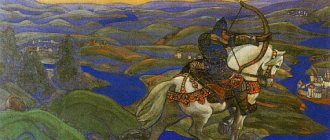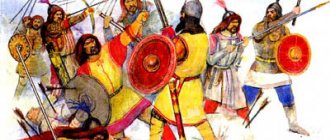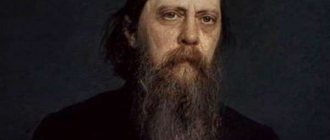- Summary
- Operas and ballets (libretto)
- Rimsky-Korsakov - The Legend of the Invisible City of Kitezh and the Maiden Fevronia
It all starts with a story where a girl named Fevronya lives. When she starts singing, all the birds flock from different places to her in order not only to sing along with her, but also to listen to her wonderful, subtle and very beautiful voice. But that’s not all, all the animals that constantly live in the forest also come here.
And then one day a young man wandered here, who, together with his group of hunters, went into the forest. When he saw this beautiful girl, he at first mistook her for a forest spirit, who had arrived here in order to find out from the animals everything that was happening in the forest. But Fevronya immediately understood everything and hurried to first feed the guest, and then ask what happened to him.
After that, the guy no longer considered her a forest spirit, because he could not only see her, but also touch her. They haven’t met yet, but the guy is already inviting her to become his wife and live with him until the end of his days. At first the girl was not going to agree, because it was still unknown on whose initiative he arrived here and what he needed here. But when I found out everything, I immediately agreed. As soon as he heard the horn being blown, he immediately hurried to run away. And when the girl came to her senses, in front of her were the same hunters who realized that one of them was missing and they decided to return and find him, and then all return home together. And only after that Fevronya understood and found out the name of her future husband. It turns out his name is Vsevolod.
Then the action moves to the shopping area, where almost all the people have gathered. And that’s all, because very soon a train with the bride and groom should arrive here, and then they and the guests will go to Kitezh.
Among them is a little bear who perfectly knows how to play the pipe and also show the bear. The gusliar sings different songs with the help of the gusli, but mostly sad songs are found here. Rich people don’t know what to do with their money and therefore are ready to give it all to Grishka, who is already drunk, but still asks everyone to get even more drunk and happily meet the bride and groom.
And now the train is approaching and all the guests are ready. But instead of the bride and groom, Tatars appear from there, who always cause only damage to all residents and kill a huge number of people. All the guests began to hide as best they could, and those who were found were immediately sentenced to death. Fevronya was among such townspeople. But no one was going to kill her, because she could still be useful to them. And you can’t find beauty in every girl. More than anything in the world, they needed to get to that same city of Kitezh, but none of the residents tell them the secret, everyone except Grishka, who can even sell himself for a bottle.
And now all the actions are transferred to the very city of Kitezh, where the Tatars are heading along with Fevronya. Fyodor gathered all the people in the square that it was Fevronya who not only told where this city was located, but also agreed to take them here and very soon they would all be here. The whole people stands up to defend the city, with Vsevolod at its head. And as if in a fairy tale, the bells begin to ring, and fog falls over the city and it becomes almost invisible.
The Tatars defeated all the soldiers, but they didn’t see the city itself, and then they realized that Grishka had deceived them, and decided to punish him. They tied him to a tree and left him until the morning. The girl felt very sorry for the prince. And Grishka asks to untie him, otherwise he will tell everyone that all the soldiers died only because of her. When Fevronya untied him, he grabbed her hand and led her into the forest. Suddenly, various and very scary visions begin throughout the forest, from which Grishka runs away. Fevronya lies down on the grass and hears birds singing, and flowers bloom around her. And Vsevolod appears behind them. Now the young bride and groom will be able to be close forever, and no one will be able to separate them.
You can use this text for a reader's diary
Operas. All works
- Ballet Romeo and Juliet
- Bellini - Norma
- Borodin - Prince Igor
- Wagner - Valkyrie
- Wagner - Death of the Gods
- Wagner - Das Rheingold
- Wagner - The Flying Dutchman
- Wagner - Lohengrin
- Wagner - Tannhäuser
- Weber - Free Shooter
- Verdi - Aida
- Verdi - Un ballo in maschera
- Verdi - Don Carlos
- Verdi - Siegfried
- Verdi - Louise Miller
- Verdi - Macbeth
- Verdi - Nabucco
- Verdi - Rigoletto
- Verdi - La Traviata
- Verdi - Troubadour
- Verdi - Falstaff
- Handel - Otto
- Gershwin - Porgy and the Bess
- Glinka - Ivan Susanin (Life for the Tsar)
- Glinka - Ruslan and Lyudmila
- Gluck - Orpheus and Eurydice
- Gounod - Faust
- Dargomyzhsky - Mermaid
- Donizetti - Don Pasquale
- Donizetti - Elixir of Love
- Donizetti - Lucia di Lammermoor
- Giselle
- Georges Bizet - Carmen
- Jesus Christ - rock opera superstar
- Kalman - Circus Princess (Mr. X)
- Corsair
- Swan Lake
- Leoncavallo - Pagliacci
- Mascagni - Rural Honor
- Mozart - The Magic Flute
- Mozart - Don Giovanni
- Mozart - The Abduction from the Seraglio
- Mozart - The Marriage of Figaro
- Mussorgsky - Boris Godunov
- Mussorgsky - Khovanshchina
- Musical Cats
- Puccini - La bohème
- Puccini - Gianni Schicchi
- Puccini - Madama Butterfly (Cio-Cio-san)
- Puccini - Manon Lescaut
- Puccini - Princess Turandot
- Puccini - Tosca
- Rachmaninov - Aleko
- Rimsky-Korsakov - The Golden Cockerel
- Rimsky-Korsakov - Pskov Woman
- Rimsky-Korsakov - Sadko
- Rimsky-Korsakov - The Legend of the Invisible City of Kitezh and the Maiden Fevronia
- Rimsky-Korsakov - Snow Maiden
- Rimsky-Korsakov - The Tsar's Bride
- Rossini - The Barber of Seville
- Rubinstein - Demon
- Rybnikov - Juno and Avos
- sleeping Beauty
- Tristan and Isolde
- Tchaikovsky - Evgeny Onegin
- Tchaikovsky - Iolanta
- Tchaikovsky - Queen of Spades
- Tchaikovsky - The Enchantress
- Tchaikovsky - The Nutcracker
Summary of “Tales of the City of Kitezh”
XIII century Summary of the book Read in 7 minutes
The legend of the city of Kitezh is a chronicle - evidence of true events. People still talk about Kitezh with the seriousness and rigor of true faith, and the “Kitezh Chronicler” is revered as a book about a saint. In the literal sense, this is a book about a saint: the founder and martyr of Kitezh, Prince Georgy Vsevolodovich, is canonized by the Orthodox Church.
So, the written version of the Kitezh legend begins with the genealogy of “the holy, blessed and great prince Georgy Vsevolodovich.” The Suzdal prince Yuri II (1189–1237), the hero of the ill-fated battle on the City River, the grandson of Yuri Dolgoruky, traces his origin here to the Pskov prince Vsevolod Mstislavich, to whom, in turn, facts that do not correspond to historical reality are attributed: for example, conversion from paganism to Christianity. Following the legendary genealogy of Georgy Vsevolodovich, which ends in 6671 (1163), it is told about his arrival from Pskov to the “blessed and great prince Mikhail of Chernigov” and about their friendly meeting. Georgy Vsevolodovich asks Prince Mikhail for “a charter in our Russia to build God’s churches by city, and cities in the same way.” Prince Mikhail agrees and predicts Prince George “for this good will, a reward on the day of the coming of Christ.” Then, having ordered the letter to be written, he goes to see off the guest himself. The year 6672 (1164) is indicated.
Prince George Vsevolodovich, the son of the holy Prince Vsevolod - Gabriel of Pskov, was the great temple builder of Ancient Rus'. He traveled to cities and built churches. It is significant that the churches he built were in honor of the Mother of God. In Novgorod he built a church in the name of the Assumption, traveled through Pskov to Moscow and there also erected the Assumption Church. In Rostov, he met with Andrei Bogolyubsky, built a temple in honor of the Mother of God and, having found the relics of the enlightener of the Rostov land, Bishop Leonty, ordered Andrei Bogolyubsky to go to Murom and there to found a church in the name of the Dormition. He himself went to Yaroslavl, which is on the banks of the Volga River, got into a plow and sailed down the Volga. Arriving at the shore, he built the city of Maly Kitezh there. The inhabitants of Little Kitezh begged the holy prince to bring the miraculous Theodore Icon of the Mother of God into their city, but “that image would not leave that place, nor do anything less,” and in the place where the icon remained, the prince built a monastery.
The “dry route” of Prince George begins from Little Kitezh.
He crossed the Kerzhenets River and arrived at Lake Svetloyar. Seeing that “the place is great,” he founded a city on the shore of the lake named Big Kitezh. They dig ditches, erect three churches (the church in the name of the Exaltation of the Precious and Life-Giving Cross of the Lord, the church in the name of the Most Holy Theotokos of the Assumption and the church in the name of the Annunciation), the future city is measured twice in length and width, and finally, three years later, the city is built. This happened in 6676 (1167). The city was two hundred fathoms long and one hundred and fifty wide.
Having built it, Prince George returns to Small Kitezh and orders to measure the distance between Big Kitezh and Small Kitezh. Then, having given praise to the Almighty and commanded him to write the book “The Chronicler,” he goes to his native Pskov. People see him off with great honor. The noble Prince Georgy Vsevolodovich, when he arrived in his city, spent many days in prayer and fasting, distributing alms to the poor.
Great Kitezh stood on earth for only seventy-five years. In 6747 (1239) the wicked and godless Tsar Batu came to Rus' to fight. Prince George, already a very old man, gathered his army with prayer and fought with Batu: the battle was great and bloody. Then the prince fled to Small Kitezh, secluded himself there for a while, and then, at night, secretly retreated with his army to Big Kitezh. Batu took Small Kitezh, exterminated all the inhabitants and began to look for ways to the capital city of Kitezh. A traitor was found, Grishka Gorodnya, or Kuterma: unable to bear the torment of the Tatars, he led them to Big Kitezh along the “Batu Trail,” which is still shown in the Volga forests. Batu approached Greater Kitezh and attacked the city with his huge army. The army of Prince George was defeated under the walls of the city, and he himself fell in the battle on the fourth of February.
What follows is a story about a miracle over the city of Kitezh, or, rather, an apology for the miracle: with references to the lives of the holy fathers, it is proven that “Great Kitezh will be invisible even before the coming of Christ” and that “in the last days and times this will happen, that hidden cities and monasteries will be " The legend of Kitezh knows three versions of the story about the invisible existence of the city.
According to one legend, Greater Kitezh was covered by the earth. Its churches, cathedrals, holy gates, and fences are now hidden in the ground, in the same place where they stood before Batu’s destruction. Under the large hill is the Cathedral of the Exaltation - in this place people pray for a long time and diligently, as before the main Kitezh shrine. The Kitezh Gate is very close to the surface of the earth, only two quarters: when men plowed in this place in the old days, it happened that their plow touched the crosses.
According to another version, the city of Kitezh took refuge in the bright waters of Lake Svetloyar. There, in the pure depths, its crosses shine, and from there its blessed ringing can be heard. People don’t travel around Svetloyar in a boat, it’s a sin to swim in its sacred waters, it’s a sin to fish: if you catch fish from Svetloyar, then there won’t be any in the Volga.
According to the third version, the city of Kitezh did not sink into the ground and did not disappear under the water: it stands on the same hills where it stood, the eight-pointed crosses of its temples also glitter with gold, the Assumption bell rings in the same way, its walls and holy gates are just as strong, the righteous people and the priestly rank are also alive - and only we, due to our sins, do not see this. This city is invisible to us, but those who have walked the path of heroism and faith see with their own eyes cathedrals invisible to us, cramped monastic cells.
Following this second, apologetic part, the narrative again briefly returns to events and historical figures: it talks about the “burial of the honest relics” of Georgy Vsevolodovich, about Batu’s murder of Prince Mikhail of Chernigov and boyar Fyodor, then Mercury of Smolensk. This third part ends with the indication that “the desolation of the Muscovite kingdom and that Greater Kitezh” took place in the summer of 6756 (1248).
Finally, the last, fourth part, beginning with the words “If any person promises to truly go to it, and not falsely,” is a completely independent, little connected with the previous argument about the path of the ascetic to the “hidden” Kitezh. We are talking about spiritual temptation and evil temptations that precede entry into a wonderful city or, as it is more often called here, a monastery. At the end there follows a praise to God, the Mother of God and all the saints.
Previous
RetellingsSummary of “The Tale of Solomon and Kitovras”
Next
RetellingsSummary of “Devgeniy’s Acts”
Act 3
In Kityazh, Prince Yuri and his son Vsevolod gather people to defend the city from the enemy. At this time, the servant Fyodor Poyarka, who was present during the Tatar attack during the wedding, appears and reports that Fevronia is leading the enemy to the city. The servant himself holds on to Otrak’s hand, since Fyodor’s enemies have blinded him. The prince sends Otrak to the bell tower of the Assumption Cathedral, so that he would be on patrol and report the enemy’s attack. Here are the Tatars at the city walls. Vsevolod asks for his father’s blessing and advances to meet the enemy. A bloody battle begins, spectacular, accompanied by the sounds of a polyphonic symphony orchestra.
Midnight. Forest. Near the lake are Tatar carts with loot and a young captive. Two heroes Burundai and Bedyai, together with Grishka, make their way through the impassable forest and emerge into a clearing. Suspecting Kuterma of dishonesty, they tie him to a tree. A dispute flares up between the heroes over the rights to Fevronia. In the midst of a quarrel, Burundai kills Bedyai with an ax. The Tatars drink, have fun and soon fall asleep. Burundai takes his trophy and invites Fevronia to sit on the carpet. He tries to bring her closer to him, but being very drunk, he falls asleep. The Tatar camp is sleeping.
Fevronia mourns the death of her groom. Grishka asks to release him. He tells the girl that it was she who was accused of the attack on Kitezh. Fevronia frees Kuterma from the tree so that he can pray for his sins before God for slander and betrayal. The villain tries to run, but his head seems to give way and he falls, unable to move.
Sunrise, the first bright rays help Grishka get to his feet and he grabs Fevronia and they run away into the depths of the forest. The Tatars wake up and terrible visions appear on the lake, horrifying them. They run away from the forest clearing.
Once again the forest plunges into darkness. Fevronia makes her way in disheveled clothes through the bushes and swamps, followed by Grigory, barely moving his legs. He is devoid of reason and constantly either whines or scolds the girl. Ashamed of his sins, Grisha runs away from Fevronia, who gives up from fatigue. She is in her native element. The birds sing a beautiful song with her. The girl sees the ghost of Vsevolod. She runs towards him, their hearts unite.
The beautiful city of Kitezh. The singing of the birds of paradise Alkonost and Sirin can be heard, and at the princely porch a unicorn with silver fur and a lion guard the chambers. Here is Fyodor, who sees everything, and his assistant Otrok. The princess and prince are greeted by the people. Prince Yuri blesses the young. Fevronia remembers the unfortunate Grishka, who remained in the terrible forest. She writes him a letter.
The work shows the strength of the Russian spirit, devotion to its Motherland and boundless human love. Opera teaches people to be kinder and forgive their ill-wishers.
Reader's diary.
Other works by the author: ← The Rhine Gold ↑ Opera and ballet The Tsar's Bride →
Russian utopia
The city of Kitezh is a symbol of something inaccessible, but desirable. This is a heavenly place where the righteous can escape from the hardships of a cruel world. It doesn’t matter whether Kitezh existed - the beautiful legend gives hope to the desperate. And in the past, bastard peasants fled in search of fertile land, and now there are fanatics who go to the Nizhny Novgorod forests, where they hide from modern life.
Kitezh is a Russian utopia. This is a place where milk rivers flow in the jelly banks. For many, this is the country of Fantasy, a fabulous state where goodness and justice rule. The most important thing about the Kitezh utopia is that people need such a city anyway. And if this legend had not existed, they would have invented another one. People need faith that they can escape from this world full of pain and despair. People need a place to escape to. At least in my thoughts. And this place became the sacred Russian city of Kitezh.
Konstantin Gorbatov “The Drowned City”
Belovodye
Many medieval legends tell of kingdoms of Good and Justice, like Kitezh. In these “hidden places” one can supposedly hide and escape from the machinations of evil. One of these places is the magical country of Belovodye. This is a fabulous land where sages live who give eternal life and secret knowledge of the past. According to legend, the country is located somewhere in Altai.
After the introduction of serfdom in Russia, many peasants left for the east. In the 17th century, Russian settlers moved to Altai. The reason for this was not only the “crowding” of Central Russia and poverty, but also the hope of finding Belovodye. Around the end of the 18th - beginning of the 19th century, “The Traveler of Mark Topozersky” was created, which described the road to Belovodye. The “Traveller” pointed the way through Krasnoyarsk and China to the “Opon” (Japanese) kingdom, which lies in the middle of the “Okiyan-sea” of Belovodye.
In Russia there are real “Kitezhi” - cities and villages flooded during the construction of reservoirs. In the photo - Krokhino in the Vologda region
Source
Svetloyar
Lake Svetloyar is located in the Nizhny Novgorod region. It is located near the village of Vladimirsky, Voskresensky district, in the Lunda basin, a tributary of the Vetluga River. The lake is 210 meters long, 175 meters wide, and the total area of the water surface is about 12 hectares.
There is still no consensus on how the lake came into being. Some insist on the glacial theory of origin, others defend the karst hypothesis. There is a version that the lake appeared after a meteorite fell. The word “Svetloyar” itself can be translated as “Bright Lake”.
The appearance of the city
The only hints about the real existence of Kitezh can be found in the book “The Kitezh Chronicler”. According to scientists, this book was written at the end of the 17th century.
According to her, the city of Kitezh was built by the great Russian Prince Yuri Vsevolodovich Vladimirsky at the end of the 12th century. According to legend, the prince, returning from a trip to Novgorod, stopped along the way near Lake Svetloyar to rest. But he was unable to really rest: the prince was captivated by the beauty of those places. He immediately ordered the construction of the city of Big Kitezh on the shore of the lake.
Yuri Vsevolodovich, founder of Kitezh, is depicted at the entrance to the Nizhny Novgorod Kremlin
They got down to business immediately. The length of the built city was 200 fathoms (straight fathom is the distance between the ends of the fingers, arms outstretched in different directions, approximately 1.6 meters), the width was 100. Several churches were also built, and on the occasion the best craftsmen began to “paint images.”
There are a lot of churches, icons too - what else does an ordinary Russian person need? The city was immediately nicknamed “saint”, and people flocked to Lake Svetly Yar.




